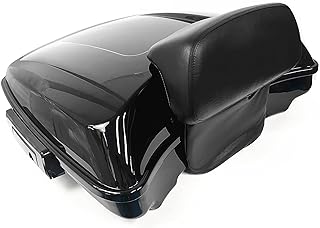5 important factors worth considering when looking for the best gpi fuel transfer pumps
When buying GPI fuel transfer pumps, it’s important to think about a few key things to make sure you get the right one for your needs. The pump’s flow rate, the type of fuels it works with, how strong it is, and how easy it is to use are all important factors that affect how well the pump will work. By carefully thinking about these factors, you can pick a pump that not only works well now but will also be reliable and cost-effective in the future for transferring fuel.
See our guide to the best gpi fuel transfer pumps.
Flow rate
When deciding to buy GPI fuel transfer pumps, one important thing to consider is the flow rate. The flow rate affects how quickly and efficiently fuel can be transferred, which is crucial for how well the pump works overall. Choosing a GPI pump with a higher flow rate can make fuel transfers faster and more efficient, which is important in many industries.
A pump with a higher flow rate can also help reduce downtime by keeping operations running smoothly and without unnecessary delays. So, investing in a GPI pump with the right flow rate is not just a choice, but a smart decision to improve how well things work.
Focusing on the flow rate when choosing GPI fuel transfer pumps brings many benefits that can improve workflow and efficiency. A pump with the right flow rate can make tasks easier, boost productivity, and save money in the long run. Whether it’s in industrial, agricultural, or other settings, having a pump with the right flow rate can make a big difference in how well things run.
So, understanding and using the flow rate feature in GPI fuel transfer pumps is not just helpful, but essential for getting the best performance and making sure operations go smoothly.
Power source (electric or manual)
When deciding on which GPI fuel transfer pump to buy, it’s important to choose between electric or manual power. Electric pumps make the process faster and more efficient thanks to automation. You can simply plug them in and start pumping, which saves time and effort, especially in situations where speed is crucial. On the other hand, manual pumps are reliable and versatile, which is great for remote locations or places without electricity. They may require more physical effort to operate, but their simplicity and durability make them a top choice for people who value reliability over automation.
Ultimately, the decision between electric and manual pumps depends on how you plan to use them and what you need for your specific fuel transfer task. Electric pumps are convenient and speedy, while manual pumps are durable and versatile. Thinking about how often you’ll use the pump, whether there’s access to power sources, and how important efficiency is can help you choose between electric and manual pumps. Whether you go for the easy operation of electric pumps or the tough reliability of manual pumps, picking the right power source is key to making sure your fuel transfer with GPI pumps goes smoothly.
Pump material and construction
When buying GPI fuel transfer pumps, it’s important to think about what they’re made of. Getting a pump made with good materials not only makes it last longer but also helps it work better. Picking a pump made with strong materials like aluminum or stainless steel can make fuel transfer faster and more reliable, especially in places where pumps are used a lot.
Choosing a pump with high-quality materials and strong construction can give you peace of mind that it will keep working well for a long time. A well-built pump can also lower the chances of it breaking down, saving you time and money on maintenance in the future. By focusing on the materials and construction of GPI fuel transfer pumps when you’re choosing one, you can get a reliable and long-lasting solution for your fuel transfer needs.
It’s important to see the pump as an investment for the long term, not just a tool you can throw away. Selecting a pump with great materials and construction can help make your fuel transfer operation more efficient and cost-effective.
Portability and ease of use
When looking to buy GPI fuel transfer pumps, it’s important to consider how easy they are to carry and use. Portability and ease of use are key factors in determining how practical and efficient a pump will be in different work environments. Being able to easily move the pump from place to place is useful for people who need to be flexible in their work, whether they’re in a big industrial setting or a small farm. Being able to do this can help improve productivity and make things more convenient.
In addition, it’s essential to choose a GPI fuel transfer pump that is simple to use. A pump that is easy for anyone to operate can save time and effort. From easy installation to straightforward operation, a user-friendly pump can make fuel transfer tasks more efficient and reduce the chance of mistakes or accidents. By investing in a pump that combines portability with ease of use, you can improve your workflow and have a better experience in different situations.
Compatibility with fuel type and viscosity
When choosing a fuel transfer pump, it’s important to consider the type of fuel you will be using and how thick or thin it is. Different fuels like gasoline, diesel, or biodiesel have unique properties that affect how well the pump works. Viscosity, which is how easily the fuel flows, can also vary depending on factors like temperature.
To avoid any damage or inefficiency, make sure to pick a GPI fuel transfer pump that is designed to handle the specific fuel type and viscosity you plan to use. Matching the pump to your fuel will not only make it work better but also last longer, which can save you money in the long run. A compatible pump will operate smoothly and reliably, reducing the chance of problems or breakdowns.
By prioritizing compatibility, you can avoid issues that may arise from using the wrong pump for your fuel. This will make your fuel transfer experience hassle-free and ensure everything runs seamlessly.
Conclusion
In conclusion, GPI fuel transfer pumps have a big impact on the fuel transfer industry. They are not just convenient, but they also help make operations more efficient and sustainable. These pumps use advanced technology and are designed with the user in mind. They not only make things easier, but they also help reduce environmental impact. GPI pumps set a new standard in the industry and show a commitment to innovation. They point to a future where precision, reliability, and eco-friendly practices come together seamlessly. Want more info on christopher knight home patio furniture sets, check the best christopher knight home patio furniture sets.



